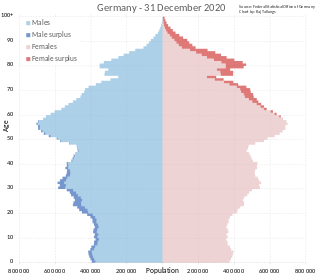
The demography of Germany is monitored by the Statistisches Bundesamt. According to the most recent data, Germany's population is 84,607,016 making it the most populous country in the European Union and the nineteenth-most populous country in the world. The total fertility rate was rated at 1.58 in 2021, significantly below the replacement rate of 2.1. For a long time Germany had one of the world's lowest fertility rates of around 1.3 to 1.4, however there has been a small increase in recent years. Due to the low birth rate Germany has recorded more deaths than births every year since 1972, which means 2021 was the 50th consecutive year the German population would have decreased without immigration. However, due to immigration the population has actually increased during the last half-century. In 2019 the number of people with a foreign background was 26%; this category includes foreigners, naturalized citizens, ethnic German repatriates from Eastern Europe and the children of all of the above.
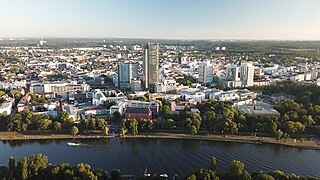
Offenbach am Main is a city in Hesse, Germany, on the left bank of the river Main. It borders Frankfurt and is part of the Frankfurt urban area and the larger Frankfurt Rhein-Main urban area. It has a population of 138,335.

Xanthi is a city in Aegean Thrace, Greece. It is the seat of the regional unit of the same name.
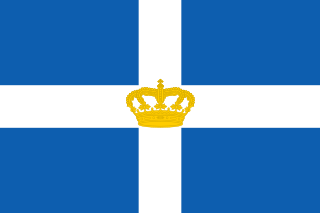
The 4th of August Regime, commonly also known as the Metaxas regime, was an authoritarian regime under the leadership of General Ioannis Metaxas that ruled the Kingdom of Greece from 1936 to 1941. On 4 August 1936, Metaxas, with the support of King George II, suspended the Greek parliament and went on to preside over a conservative, staunchly anti-communist government. The regime took inspiration in its symbolism and rhetoric from Fascist Italy, but retained close links to Britain and the French Third Republic, rather than the Axis powers. Lacking a popular base, after Metaxas' death in January 1941 the regime hinged entirely on the King. Although Greece was occupied following the German invasion of Greece in April 1941 and the Greek government was forced into exile in the British-controlled Kingdom of Egypt, several prominent figures of the regime, notably the notorious security chief Konstantinos Maniadakis, survived for several months in cabinet until the King was forced to dismiss them in a compromise with the representatives of the old democratic political establishment.

Italian Germans are German-born citizens who are fully or partially of Italian descent, whose ancestors were Italians who emigrated to France during the Italian diaspora, as well as the communities of Italians in Switzerland. Most Italians moved to Germany for reasons of work, others for personal relations, study, or political reasons. Today, Italians in Germany form one of the largest Italian diasporas in the world and account for one of the largest immigrant groups in Germany.
Minorities in Greece are small in size compared to Balkan regional standards, and the country is largely ethnically homogeneous. This is mainly due to the population exchanges between Greece and neighboring Turkey and Bulgaria, which removed most Muslims and those Christian Slavs who did not identify as Greeks from Greek territory. The treaty also provided for the resettlement of ethnic Greeks from those countries, later to be followed by refugees. There is no official information for the size of the ethnic, linguistic and religious minorities because asking the population questions pertaining to the topic have been abolished since 1951.

Gommern is a town in the Jerichower Land district, in Saxony-Anhalt, Germany. It is situated approximately 15 km (9 mi) southeast of Magdeburg. On January 1, 2005, the municipalities Dannigkow, Dornburg, Karith, Ladeburg, Leitzkau, Menz, Nedlitz, Vehlitz and Wahlitz have been incorporated into Gommern. On January 1, 2008, Prödel was incorporated, and on January 1, 2009, Lübs was incorporated.

Turks of Western Thrace are ethnic Turks who live in Western Thrace, in the province of East Macedonia and Thrace in Northern Greece.

Alheim is a municipality in Hersfeld-Rotenburg district in northeastern Hesse, Germany. It is named after nearby Alheimer Mountain. Alheim consist of 10 former souverain villages situated on both banks of the river Fulda.

Pakistani-Germans refers to the community in Germany of Pakistani heritage or citizenship.
Indians in Italy comprise the second largest population of Indians in Continental Europe, after Indians in Germany. Although Italy and India have maintained important relations since ancient times, significant Indian migration to Italy is a recent phenomenon. Many Indians began immigrating to Italy in the early 1990s, when the Italian government initiated programs to get Indian IT professionals and engineers to contribute to the technology sector in Italy. Most Indian immigrants came to Italy legally.

The Moldovan diaspora is the diaspora of Moldova, including Moldovan citizens abroad or people with ancestry from the country, regardless of their ethnic origin. Very few of them have settled in other parts of the world, but there is a significant number of them in some countries, mostly in the former Soviet Union, Italy, Spain, Romania, Portugal, Greece, Canada, and the United States of America.
German Afghans are German citizens with Afghan ancestry and non-citizen residents born in, or with ancestors from, Afghanistan. It is the largest Afghan community in Europe and part of the worldwide Afghan diaspora, of which it is one of the largest. In 2022, the Federal Statistical Office of Germany estimated the number of people of Afghan descent residing in Germany at 425,000 the third largest from outside the EU, and the largest group from Asia excluding the Middle East and Caucusus. In particular, there are over 50,000 Afghans in Hamburg alone, comprising over 7% of the city's population. Offenbach am Main and Hamburg had the highest shares of Afghan migrants among all German districts in 2011. There were 51,000 people of Afghan decent living in Hamburg in 2023.
The Albanians in Germany refers to the Albanian migrants in Germany and their descendants. They mostly trace their origins to Albania, Kosovo and to a lesser extent to North Macedonia and other Albanian-speaking territories in the Balkan Peninsula. Their exact number is difficult to determine as some ethnic Albanians hold German, Macedonian, Serbian or another Former Yugoslavian citizenship.
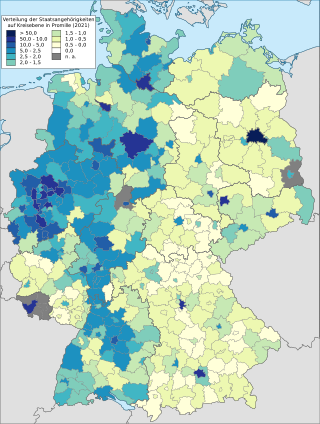
Arab Germans, also referred to as German Arabs or Arabic Germans, are ethnic Arabs living in Germany. They form the second-largest predominantly Muslim immigrant group in Germany after the large Turkish German community.

Cemile Giousouf is a German politician; she was the first ever Muslim member of the Christian Democratic Union (CDU), serving as Member of the Bundestag for one legislative term from 2013 until 2017.

In the narrow sense, Lebanese people in Germany include migrants from Lebanon living in Germany and their descendants, excluding Palestinians.
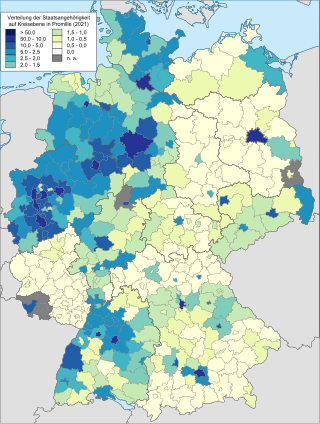
Iraqis in Germany include migrants from Iraq to Germany, as well as their descendants. The number of Iraqis and Iraqi-Germans in Germany is estimated at around 310,000 people. The Iraqi community is ethnically, culturally and linguistically diverse and includes Mesopotamian Arabs, Kurds, Iraqi Turkmen, Mandaeans, Assyrians and Yezidis.
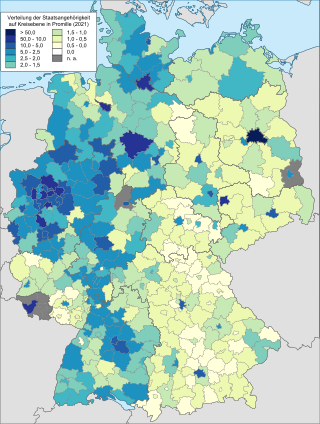
Syrians in Germany refers to Syrian immigrants in Germany, or Germans with Syrian ancestry. The number of people with an immigration background from Syria, including those with German citizenship, was estimated at around 1,225,000 in 2022. Additionally, the population with Syrian citizenship residing in Germany is 923,000 in 2022, making it the second-largest group of foreign nationals living in the country. Notably, Germany boasts by far the largest Syrian diaspora outside of the Middle East.

Romanians in Germany are one of the sizable communities of the Romanian diaspora in Western Europe. According to German statistics, in 2022, the number of Romanian citizens in Germany was 883,670. The number of people with Romanian ancestry in 2022 was 1,096,000.





















